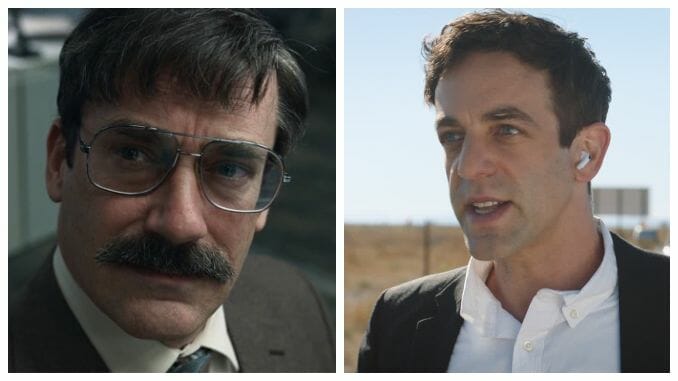B.J. Novak and Jon Hamm Accidentally Say Something about Adrift White Men in Vengeance and Corner Office

The curse of starring on a TV show that nearly everyone considers a modern classic is that the classic rules of TV-to-movie stardom still apply. For the most part, the boundaries between television and film are far more porous than they’ve ever been, with most contemporary stars willing to bounce between theatrical movies, streaming movies and prestige television. (Only a handful of exceptions spring to mind; the success of Top Gun: Maverick all but ensures that a Tom Cruise character will never grace a TV screen before a robust 45-days theatrical window is up.) Yet this flexibility hasn’t yet resulted in a triumphant film career for, say, Mad Men’s Jon Hamm or The Office’s B.J. Novak, who both had star vehicles play at 2022’s Tribeca Festival.
To be clear, Hamm and Novak have achieved some success on the big screen. Hamm co-stars in the very Cruise vehicle that has helped save everyone’s faith in the theatrical experience; he’s also appeared in some hits (The Town, Baby Driver), the odd underseen indie (Marjorie Prime) and at least one underrated comedy (Keeping Up with the Joneses). Novak has been more scarce in movies, but managed to co-star in Quentin Tarantino’s Inglourious Basterds. Both actors have worked plenty in other TV shows and Novak continued cultivating a successful writing career.
Perhaps it’s only natural, then, that Novak would attempt to parlay his multi-hyphenate status into a movie he would write, direct and—gulp—star in. For a multimedia bonus, Novak’s Vengeance is actually about—double gulp—podcasting. Novak plays Ben, a callow young New Yorker contributor with his eye on a breakthrough podcast, despite his lack of an actual subject. When he pitches NPR-equivalent producer Eloise (Issa Rae) at a party, she tells him he has more of an idea than a story. Soon, he lucks into a story with a kind of grim fortune: The family of a recently deceased girl he casually knew—one of seemingly dozens of playing-the-field hook-ups—gets in touch with him, under the mistaken impression that he is her long-distance boyfriend. They ignore his delicate (some might say cowardly) attempts to explain their relationship, and he agrees to attend her funeral in small-town Texas—where he finds out that the family believes that she was murdered. Suddenly, Fake NPR is interested, so he decides to stick around and do some investigating.
Novak obviously believes he’s performing some kind of self-interrogation by playing Ben, who is introduced callously justifying his womanizing opposite a character played by John Mayer (who Novak apparently hung out with in real life; must he pay such meticulous tribute to reality, even if it’s supposedly satire?). Ben views the Texans as unsophisticated rubes and, in their conviction that their sweet daughter was a murder victim and not an overdose, they strike him as ripe material for a story about American self-delusion. That Ben himself engages in his share of self-deception is never in doubt; Novak is essentially playing an Ivy League version of Ryan, the intern-turned-corporate-manipulator he brought to life as both writer and performer on The Office. In a leading role, that weaselly respectable-white-boy quality just isn’t very interesting without some greater magnetism. Ben is the kind of part that cries out for someone with a glimmer of salesy showmanship—someone who can sell himself while convincing people around him that he’s an earnest man of ideas. Novak made a fine stealth sidekick in Basterds because he could be quiet and clean-cut opposite Brad Pitt’s grandstanding. In this spotlight, his TV handsomeness turns transparent, and you can see straight through to all of the points Novak is trying to make about himself, or his generation, or whatever.
-

-

-

-

-

-

-

-

-

-

-

-

-

-

-

-

-

-

-

-

-

-

-

-

-

-

-

-

-

-

-

-

-

-

-

-

-

-

-

-








































